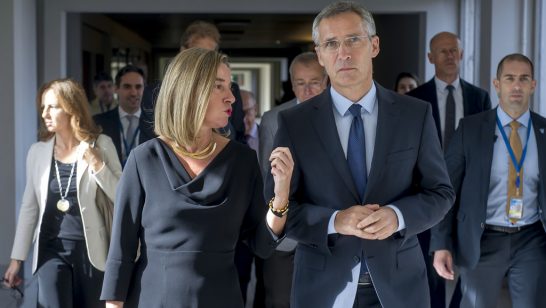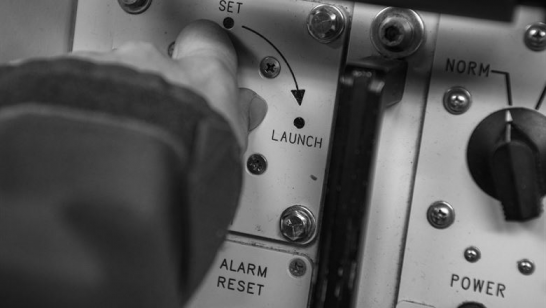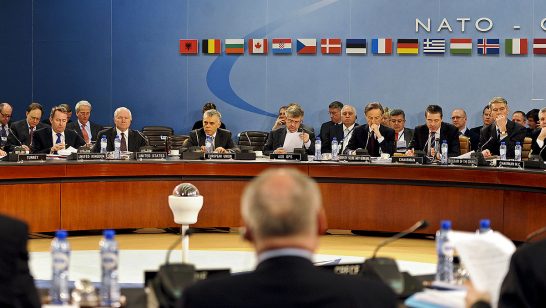
The 70th Anniversary of NATO has provided a good opportunity for reflection on grand strategy. Throughout the Alliance’s history the management of armed forces, especially nuclear arms, has been a core issue, not least the question of their retention or abolition. But against what span of history can we expect nuclear weapons to be possessed but not used? Another 70? Reviewing the counterfactuals of history, do we see that the perennial wars of early and modern Europe would have been brought to a halt had all sides been nuclear armed? Or, to confront the Thucydides’ trap, that the wisdom of Greek philosophy would have prevented any war had the states of the Peloponnese had their own deterrents? Accident and irrationality remain the Achilles heels of deterrence.
The Trump Administration addressed the conditions in which nuclear disarmament might be practical in a recent initiative in Geneva. The argument being that nuclear disarmament, and indeed disarmament in general, can only take place securely in times of harmony. It is similar to an argument made by Professor Colin Gray that arms control is at best a distraction and occurs in the aftermath of, not as a means of defusing, conflict.
However, records of efforts to control weapons demonstrate the opposite: effective weapons control measures have been agreed by states at times of great confrontation and out of a mutual fear of self-destructive war. In the understanding that destruction would be mutual and assured unless forms of cooperative security were developed. These past measures, agreed in extremis, are neglected mechanisms whose renovation provides a basis for a renaissance in disarmament and weapons controls.
In the early 1960s, the Cuban missile crisis led to an increase in nuclear arms but also renewed attempts by the US and Soviet leaders to restrain weapons developments. At this time, nuclear test explosions were a frequent feature of international life. Mass public protests and the detection of radiation in milk resulted in the partial test ban treaty, and later in a comprehensive test ban as a condition for making the Non-Proliferation Treaty permanent. Today a single nuclear test explosion produces international attention of crisis proportions.
In the 1980s, fear of losing control and the impact of public political processes resulted in the INF and START Treaties. In Europe, agreements to provide confidence in the exercise and deployment of armed forces came into place, and later in measures to limit equipment – A process that began in the Helsinki final act of the 1970s and culminated in the Charter of Paris of 1990. Political leadership, notably from Soviet President Michael Gorbachev, was crucial to these measures. Despite the post-facto rationalisation in the West that these were agreements made with a defeated foe, it is demonstrable that Western leaders and their supporting communities did not envisage the Soviet Union as being on the verge of collapse. Indeed, academic international relations scholars later conducted a brief period of self-examination over their failure to predict the fall of the USSR.
From 1990, disarmament and arms control slipped further and further down the agenda. Today we are witnessing the collapse of some of the remaining treaties –INF and START– until recently universally regarded as essential to international security. Regional crises and destabilising weapons developments crowd each other in news streams: North Korea, India and Pakistan, the South China Sea, Iran, Yemen, hypersonic missiles, cyber war and anti-satellite weapons. Theoretical, historical, and practical responses to uncontrolled arsenals require a dynamic revival of cooperative security. For politically engaged publics and elites, the conversation needs to point to the Paris Charter on Climate Change, and ask how this may be replicated to manage weaponry. A technically simpler task than adjusting the world’s industrial production model. Historically the international community has crafted grand strategy in the form of the UN Charter, in the Western developed NATO Alliance – and in NATO, in the famous Harmel report of the 1960s which commit parallel political measures to accompany military deterrence. We need to restart such processes.
One contribution is the draft treaty for a Strategic Concept for the Removal of Arms and Proliferation (SCRAP) presented by a team from the Centre for International Studies and Diplomacy at the SOAS, University of London at a seminar in Geneva earlier this year. The SCRAP Treaty brings together best practice in weapons control and would revive and universalise the confidence and security building measures of the Open Skies and Stockholm Agreements, including naval, and drone technologies. Verification technologies are more effective and accessible than in the 1990s: One could well conceive the idea of a crowd-sourced open access global verification service.
US-Russian agreements on missiles in INF and START are capable of global application. The notion of a globalised INF Treaty was discussed around the UN Conference on Disarmament by France, Russia, the US and UK in 2007. The initiative presents both profound opportunities and obstacles. The obstacle being that China and regional powers in the Middle East and South Asia regard INF weapons as core strategic systems and will not accept such imbalance; The opportunity is to build on the P4 concept of globalising on Treaty, INF to the broad range of security treaties.
In the area of army and air force equipment, the decaying Conventional Armed Forces in Europe Treaty provides a set of neglected but proven mechanisms capable of governing all forms of major conventional weapons; expanding into the naval sphere where systems are far smaller in number and more transparent. At lower intensity conflict levels, Latin America and West Africa have taken the lead in legalising UN procedures on small arms.
UN Security Council provisions provide a further, if controversial, opportunity. The provisions for inspecting the disarmament of Iraq, mandated by the UNSC, were comprehensive across the Weapons of Mass Destruction (WMD) spectrum – through the work of the United Nations Special Commission (UNSCOM), Monitoring, Verification and Inspection Commission (UNMOVIC) and the International Atomic Energy Agency (IAEA). While the modern provisions of the IAEA, the Chemical Weapons Convention (CWC), draft Biological Weapons Convention (BWC) protocol, and the Nuclear Threat Initiative (NTI)’s work on nuclear warheads are all vital mechanisms for a global system of controls, the Iraq inspection regime provides a powerful, and scalable, set of practical precedents.
Taken together, present WMD agreements, along with the end of Cold War provisions and Iraq inspection regime provide a substantial answer. Perhaps there is an opportunity for a third great charter of Paris.
In a bygone era, human rights and disarmament were integral in civil society and a number of states’ policies. Ideas of cooperative security bore fruit. Political leaders and civil society alike were vaunting in their ambition. Today, there is again a growing global fear of self-destructive war. Treaties long agreed to be the “foundations” of European and global security have decayed or been cast aside. The political and policy response has been fragmentary, tactical and defensive. First principles have been lost from sight. The fundamental principle that disarmament should be irreversible has been discarded; and the role disarmament and arms control to enhance deterrence, lost from analysis.
At the root of the issue is the self-destructive potential of industrial society. Climate Change is one such example; weapons are another.
To tackle the threat of climate chaos the international community realised the need for a common global approach through the Paris Agreement. Thirty years ago, the Charter of Paris ended the cold war on the basis of shared understandings of cooperative security amongst adversaries regarding weapons controls. Perhaps Paris can be the venue of a third great agreement eliminating and governing ‘Weapons of All Destruction’; the SCRAP Treaty shows a way to do that that may meet President Trump’s reported personal interest in curbing arms racing.
The opinions articulated above also do not necessarily reflect the position of the European Leadership Network or any of its members. The ELN’s aim is to encourage debates that will help develop Europe’s capacity to address pressing foreign, defence, and security challenge.



